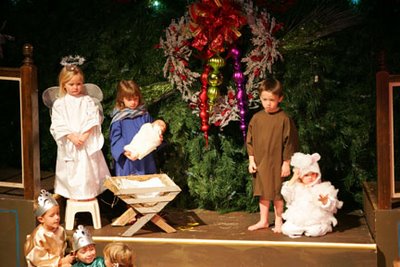 The Modern Masonic Journal has republished a most interesting article called "The Christ Myth," originally written in 1941 by John G. Jackson.
The Modern Masonic Journal has republished a most interesting article called "The Christ Myth," originally written in 1941 by John G. Jackson.Jackson takes you through a hypothetical December day in the life of a young Israeli child, a few years before Jesus's supposed birth. Visiting first the Roman part of town, then the Persian, then the Egyptian. Everywhere the child goes, he finds people preparing for the feast day of December 25. Each culture is preparing to honor their Sun God, re-born on the 25th of December each year.
Well documented and footnoted, Jackson's article explores the historical evidence for the man Jesus. Other than a few most-likely bogus additions to Josephus, there isn't a lot of literary evidence. The Biblical Gospels of Matthew, Mark, Luke and John are about all we have to work with. Jackson shows with example after example how these four records give, basically, four different accounts of the life of Jesus.
Jesus Christ | Christian | Christianity | Bible | Josephus | Born Jesus

2 comments:
thought you might find this interesting. Jesus was not born on December 25th...Constantine and the Catholic Church set that date up, partly as Church expansion and that's why it lines up with the other religions. When was he born? During the Feast of Tabernacles "Sukkot" - He didn't sleep in a "manager" but rather a "Sukka" because that was the only space that was open. Since he is the Living Tabernacle this has even more messianic symbolism. Notice that there would be no need for Shepherds to be with there flocks in late December --- Sukkot is roughly around late September early October...
Sukkot
Level: Basic
...On the fifteenth day of this seventh month is the Festival of Sukkot, seven days for the L-RD. -Leviticus 23:34
The Festival of Sukkot begins on Tishri 15, the fifth day after Yom Kippur. It is quite a drastic transition, from one of the most solemn holidays in our year to one of the most joyous. Sukkot is so unreservedly joyful that it is commonly referred to in Jewish prayer and literature as Z'man Simchateinu , the Season of our Rejoicing.
Sukkot is the last of the Shalosh R'galim (three pilgrimage festivals). Like Passover and Shavu'ot, Sukkot has a dual significance: historical and agricultural. Historically, Sukkot commemorates the forty-year period during which the children of Israel were wandering in the desert, living in temporary shelters. Agriculturally, Sukkot is a harvest festival and is sometimes referred to as Chag Ha-Asif , the Festival of Ingathering.
The word "Sukkot" means "booths," and refers to the temporary dwellings that we are commanded to live in during this holiday in memory of the period of wandering. The Hebrew pronunciation of Sukkot is "Sue COAT," but is often pronounced as in Yiddish, to rhyme with "BOOK us." The name of the holiday is frequently translated "Feast of Tabernacles," which, like many translations of Jewish terms, isn't very useful. This translation is particularly misleading, because the word "tabernacle" in the Bible refers to the portable Sanctuary in the desert, a precursor to the Temple, called in Hebrew "mishkan." The Hebrew word "sukkah" (plural: "sukkot") refers to the temporary booths that people lived in, not to the Tabernacle.
Sukkot lasts for seven days. The two days following the festival, Shemini Atzeret and Simchat Torah, are separate holidays but are related to Sukkot and are commonly thought of as part of Sukkot.
The festival of Sukkot is instituted in Leviticus 23:33 et seq. No work is permitted on the first and second days of the holiday. (See Extra Day of Holidays for an explanation of why the Bible says one day but we observe two). Work is permitted on the remaining days. These intermediate days on which work is permitted are referred to as Chol Ha-Mo'ed, as are the intermediate days of Passover.
I find it interesting that some people think Jesus was a "myth." How much documentary evidence do you need to support his historical existence? Why is it that what historians call "primary documents" are generally accepted as proof of the existence of historical figures, but apparently not in the case of Jesus.
We've got four accounts of his life written by four of his closest confidents (matthew, Mark, Luke, and John). Seems like pretty compelling evidence to me. Sure the gospel accounts might be somewhat different: they were written by four different men, with different personalities, different memories, different values, different biases, etc. Each man had also led a different life prior to joining Jesus: Matthew was a tax man, Luke was a physician from Syria, while John was a fisherman.
Not only that, but they were writing their memoirs down decades after the events had occurred! There's bound to be a difference of opinion. If you and your brother tried to recall an event from childhood, are you both going to have the EXACT same memory of the events? I highly doubt it.
Post a Comment